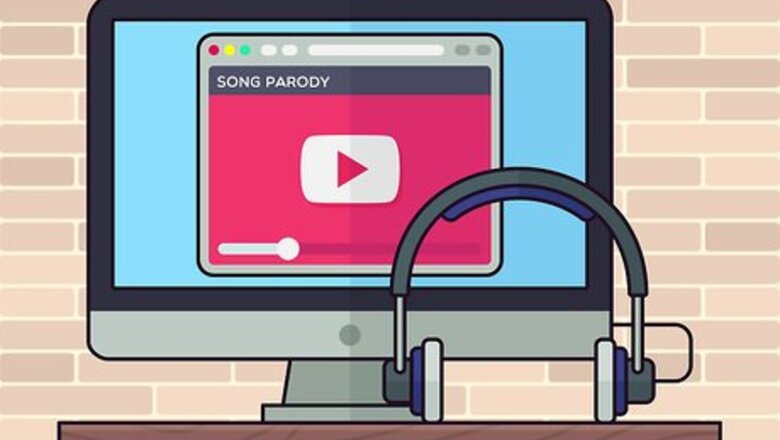
views
Selecting a Type of Parody
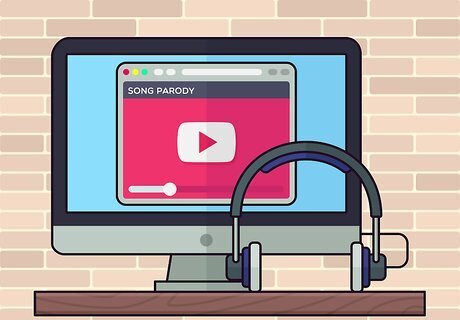
Listen to other parodies. Weird Al Yankovic, Lonely Island, Tenacious D and Deathlock all parody songs and styles of music. They’ll give you an idea of what a good parody does and how the genre works. Listen to as many parody songs as you can to get a good idea of where to start. If you can, listen to parodies of the same genre of music that you are thinking of writing a parody for. For example, if you want to write a pop parody, listen to pop parodies.

Think about your target audience. The kind of parody you write will depend a lot on the people that will be listening to it. If you're just going to show it to friends, it will make sense to choose a song that you all like. For larger audiences reached with a Youtube post, you'll want to pick a more widely popular song. Knowing your audience will help you narrow down what sort of song to write a parody for.

Decide what kind of parody you want to make. Some parodies are funny, others are educational, and others parody entire genres instead of specific songs. The type of parody you write will depend on your personality and the kind of audience you want to reach.
Choose a humorous parody if you want something easy. They are the most common type of parody song. For this type of parody, you’ll change the lyrics of a popular song or one that’s easy to recognize. The new lyrics will be silly, offbeat or downright hilarious. Examples include: “White and Nerdy” by Weird Al Yankovic “What Makes You Beautiful” by The Key of Awesome “The Star Wars I Used to Know” by Teddie Films
Consider an educational parody to help you study. They are great for helping you remember facts because the info is set to the tune of a popular song. You can write your own educational parodies for classes you’re taking, such as math, geology, or art history. Pick a song, then write new lyrics about the subject. Educational parodies are often written by teachers or coaches for their students
Try a genre parody if you want something more general but still funny. These types of parodies involve a little more work, because you may have to write your own original song instead of use an existing pop song. You’ll use an original song to make fun of stereotypes about certain types of music, like metal or overly-sexual pop songs. To find examples of genre parodies, look up "Deathklok" or "The Lonely Island."
Parodying an Existing Song

Pick a good song to parody. It needs to be a song that people recognize instantly, so a current pop hit or an old standard would be a good choice. Again, make sure it’s also a song that appeals to your target audience. If you’re writing a parody song for your friends who love hip hop, you might pick a Kanye West song instead of a Katy Perry song. Pick a song with a distinct chorus and verses. The more separate and obvious the verses and choruses of a song are, the easier it will be to write your parody. The chorus can be repeated multiple times, and you’ll only need to write new words for the verses. Pick a song you like. Parody writers generally admire the songs that they parody, and decide to make them funnier. You'll also have to listen to the song many times to write the lyrics, so don't pick a song that you dislike.
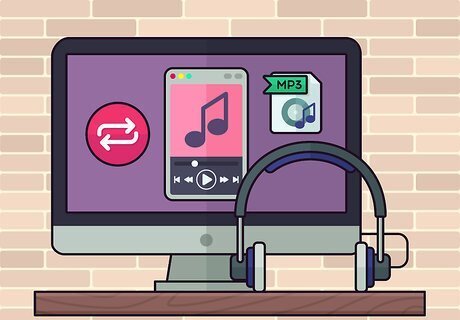
Listen to your song. Listen to the song a few times to get a feeling for the beat and the flow of the lyrics. Start thinking about good substitutes for words in the songs. Some parodies will come naturally, because the words may sound like other, more funny words or plots. For example, Weird Al’s “Eat It” and “White and Nerdy” started out as “Beat It” and “Ridin’ Dirty.” Think about potential substitutes. The kind of lyrics you'll want to write obviously depend on your sense of humor and the type of song, but there are different things you can look out for. Listen for words in the chorus that could be substituted for other words, especially if the new words are silly or ridiculous: "Sugar" by Maroon 5 might become "Booger", while "Hotline Bling" by Drake could become "Burger King".
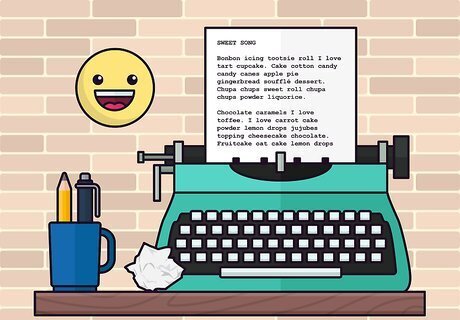
Leave some phrases. For some songs, you may not have to change certain lyrics. If some lines could have double meanings, leave them to create extra comedic effect. For example, “TNT” by AC/DC could become an education song about actual explosives, while “Stone Cold” by Demi Lovato could turn into a song about the wrestler.
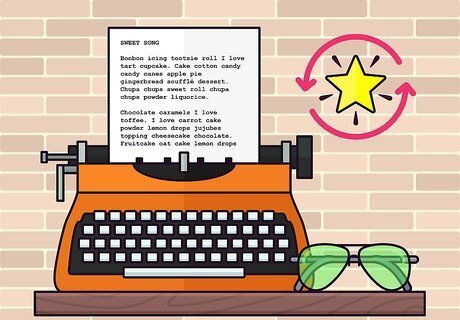
Start generating the theme for your parody. You’ll want your parody to have a cohesive theme from start to finish. Some parodies tell stories, while others describe situations or types of people. Either way, you’ll want the chorus and verses to play off of each other, instead of having them be disjointed or about topics that don’t match up. Change a word to something silly to generate your theme. Once you have one funny word, like "Booger" instead of "Sugar" or "Burger King" instead of "Hotline Bling", build the rest of the song around it. "Burger King" could be about working at a Burger King or going on a late night run for fast food, while "Booger" could turn into a story about gross bodily functions. Make up a story. If you haven't found any substitute words yet, simply make up your own topic. The more off the wall it is, the funnier your parody will be. "Work" by Rihanna could become a story about hating your job, while "Trap Queen" by Fetty Wap could turn into a story about a female fur trapping expert from Alaska. Write educational content with a sense of humor. Write a Christian-Pop-style song about Charles Darwin or a song about geology to the tune of "I Love Rock and Roll." Make sure to include all of the information you want to teach in your educational song: the catchier it is, the easier the material will be to remember.
Making a Genre Parody
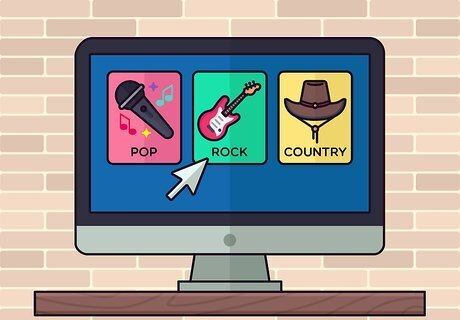
Pick a genre with lots of stereotypes that are funny and easy to exploit. Every style of music has its own idiosyncrasies and stereotypes that are easy to make fun of. Pop music is repetitive and silly; metal is loud and angry; country musicians sing about ex-partners and trucks. Remember your target audience too; it won't make any sense to parody a classic rock song if none of your audience is old enough to remember AC/DC or Queen.

Find or record a generic instrumental. A genre parody will require different resources than a song parody. Since you're making fun of a style of music instead of a single song, you will be able to use any instrumental track in that genre and it won't have to be well known or recognizable. Check online for databases of instrumental tracks. Some are free, while others you'll have to pay for. If you're a musician, record or make the track yourself. If you make the track, you'll have a little more creative control over your parody. You'll be able to ham up silly elements of a genre, like long breakdowns or over-the-top synthesizer choruses.

Decide what aspects of the genre to parody. There are many things about music genres that make them irritating or fun to parody. Subject matter of songs, attitudes of performers or aspects of the music itself can be parodied. Make fun of the subject matter. Flight of the Concords and The Lonely Islands are two bands that love to parody stupid or silly lyrics and subject matter: check out their parodies for some examples. The more vapid, meaningless or over-the-top the subjects and lyrics of your chosen genre, the easier they will be to make fun of. Parody the attitudes and actions of the genre's performers. Acts like Dethklok, The Rutles and Spinal Tap are great examples of this. All poke fun at the way that their genre's performers sing, act and view the world. The Rutles, for example, performed in a feature called "All You Need is Cash," making fun of the Beatles commercialization. Dethklok parodies metal musicians hyper masculinity, violence and anger in the show Metalocalypse. Note that these more elaborate parodies often involve dressing and acting like the musicians, so they will be more effective if you make a music video for your parody or play a live gig. Parody aspects of the music. Every genre has memorable and unique musical characteristics make them easy to parody. For example, you might parody excessively long guitar solos in classic rock songs, corny saxophone runs in an 80s ballad, or apocalyptic sounding rap beats.
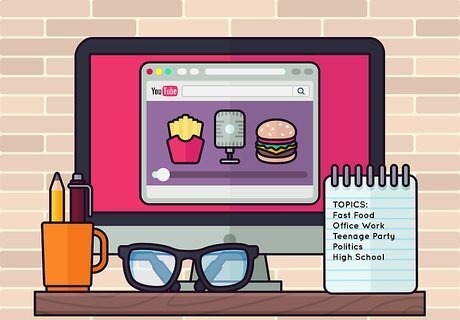
Pick a topic for your parody. Even if you're just parodying a part of a genre, you'll still need a whole song's worth of lyrics. Pick a funny subject and/or a very stereotypical one for your genre: a country parody might be about having 20 tractors, while a pop parody might be about a veiled innuendo. Consider unexpected topics. Some parodies are humorous because they introduce topics you didn't expect in a specific category. For example, Mac Sabbath perform songs in the style of Black Sabbath, but sing about fast food. You might consider writing a gangster rap song about working in an office or an easy listening song about a crazy party.
Writing the Lyrics
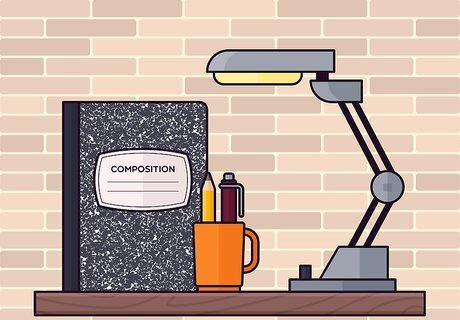
Write the lyrics. Once you’ve nailed down a theme and a few funny phrases here and there, flesh out the rest of the song. It might take a while, and a lot of brainstorming, so get ready to be creative. Your lyrics will depend on whether you're writing a song parody or a genre parody. In general, song parodies will require more attention to detail, while genre parodies only have to fit the backing track.
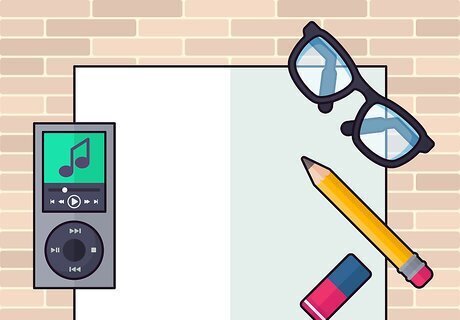
Start with a blank sheet of paper. Write in pencil so you can erase parts of the song if you change your mind. Don’t worry about changing the lyrics too many times: part of the creative process is getting rid of ideas when they don’t work. Listen to the song slowly, stopping the track after each phrase, writing down lyrics that come to mind. If you are more of a digital person, then you can do this on the computer using a word editing program, such as Notepad or Microsoft Word.
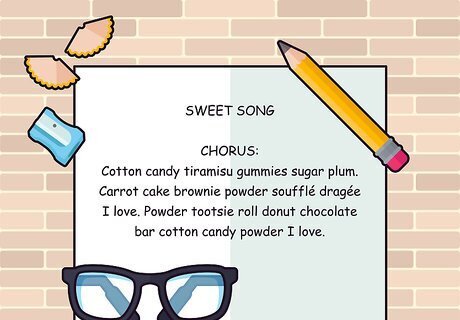
Write the chorus first. The chorus contains the hook and is the main part of the song, so start there first. Listen to the chorus as many times as you need to while writing. If you're writing a song parody, pay close attention to the flow of the words and the chorus melody. You want to match these as closely as possible. Pay attention to the line breaks. Don't write everything out in a single paragraph. Try to keep each sentence in its own line.
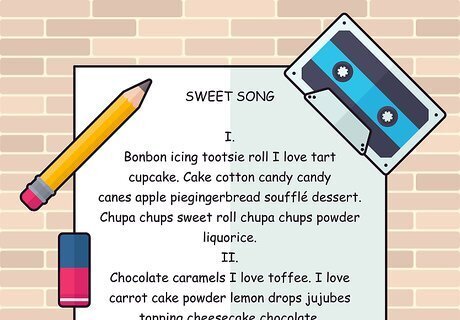
Work on the verses in order. Start with the first chorus and work your way to the end of the song, counting bridges and breakdowns as verses too. You’ll want to work from the beginning to the end so that your song makes sense all the way through. If you write separate verses in a random order, the plot of your song may not make sense.

Match rhymes and rhythms if you're writing a song parody. The more your song sounds like the original, the better and funnier the parody will be. Your listener will immediately recognize a famous tune, but if your lyrics and rhythm don't match the original, they'll only be confused. Try to closely match the types of words and descriptions as closely as possible, listening to the song as many times as you need to. Match the rhythm and flow of the lyrics, and don't try to cram too many words into a single phrase. More words may help you tell your story, but it won't sound much like the original song. Try to rhyme your lyrics with the actual song. While it may be really difficult, try to rhyme the words in your song with the words in the real song. This will help it sound more like the original. Use a rhyming dictionary if you get stuck.
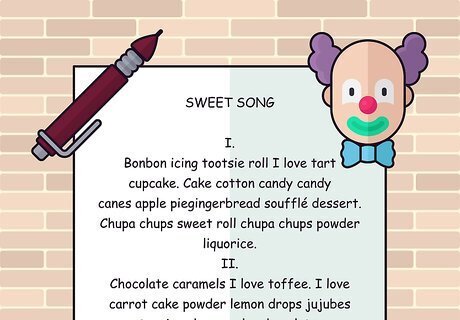
Exaggerate a genre parody. The more outrageous and silly your genre parody is, the funnier it will be. In The Lonely Island’s “Jack Sparrow,” the group makes fun of rap songs with epic choruses, and the choruses get more and more ridiculous and epic each time they come around. Don’t be afraid to ham it up a little bit for comedic effect.
Recording the Parody
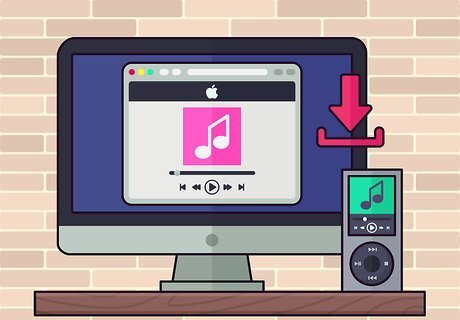
Find or make an instrumental track. The instrumental track will be the backbone of your song, so you’ll want it to be of good quality. The type of track you make or download will be different depending on which type of parody you want to make. Find an official instrumental. If you’re parodying a current song, you’ll often be able to find an instrumental of the backing track on the artist’s album or website. If you can’t find what you’re looking for, search online for the instrumental on Soundcloud or Youtube. DJs and electronic artists often get exclusive copies of the tracks and share them. Use a karaoke track. While karaoke tracks can sound a little corny or canned, they might work well enough for what you want to make. Search karaoke archives or websites for the track that you need. You may have to pay for these tracks, however. Edit your own instrumental. It may be possible to edit the lyrics out of the song you want to parody. Certain plugins for audio editing software can remove vocals, or you can cut and paste sections of a song with no lyrics to make a word-free version. The quality of your product will depend a lot on your editing skills and the type of song. Play the song on your own instruments. If you’re skilled with a guitar, piano or other instruments, make your own backing track. Record and edit it before you lay down vocals to make sure that you have the verses and choruses in the right places.

Record your vocals. Use recording software and a microphone to record your vocals. Use audio editing software that came with your computer, such as Garageband, or download open source software like Audacity. Edit your recording. Do a few takes of your vocals and then pick and choose which are best. You can edit together better performances of verses and choruses to make the best recording possible.
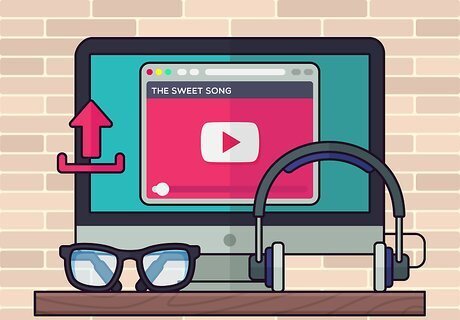
Share your parody. Upload your song to a platform like Soundcloud, iTunes, Facebook, Myspace, Bandcamp or Youtube. This will allow many people to check out your creation. Don’t forget to spread the word across your own social media profiles. The more interest you create, the more views you’ll receive.. If you upload on Youtube, consider making a music video to complement your parody. Many popular Youtube videos are parodies, and their videos are as funny as their songs. Buy or borrow a good camera, film and edit a video to go with your song to create an even bigger impression.














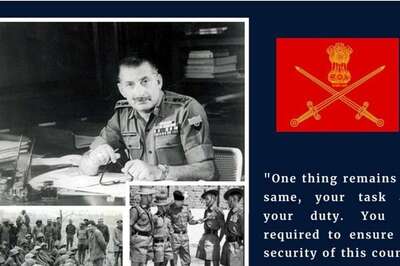





Comments
0 comment